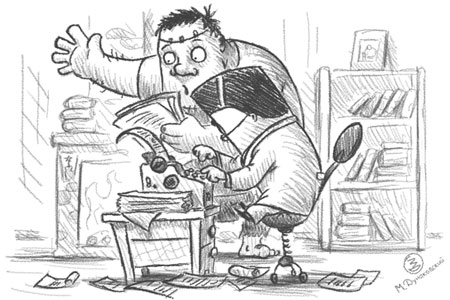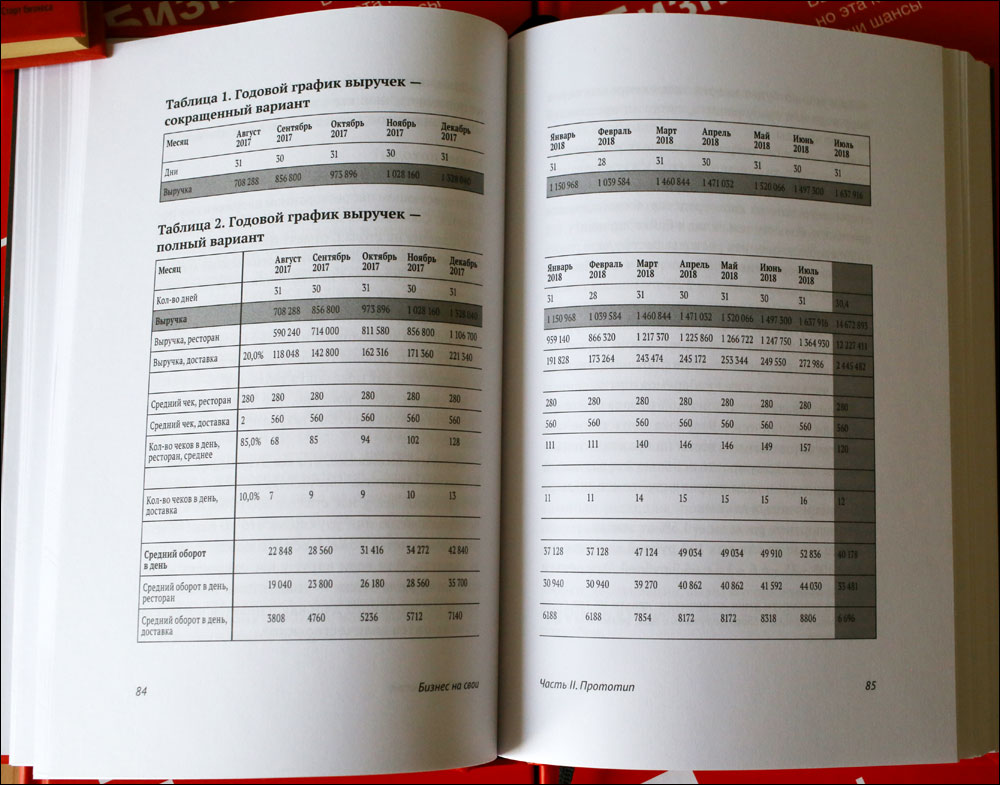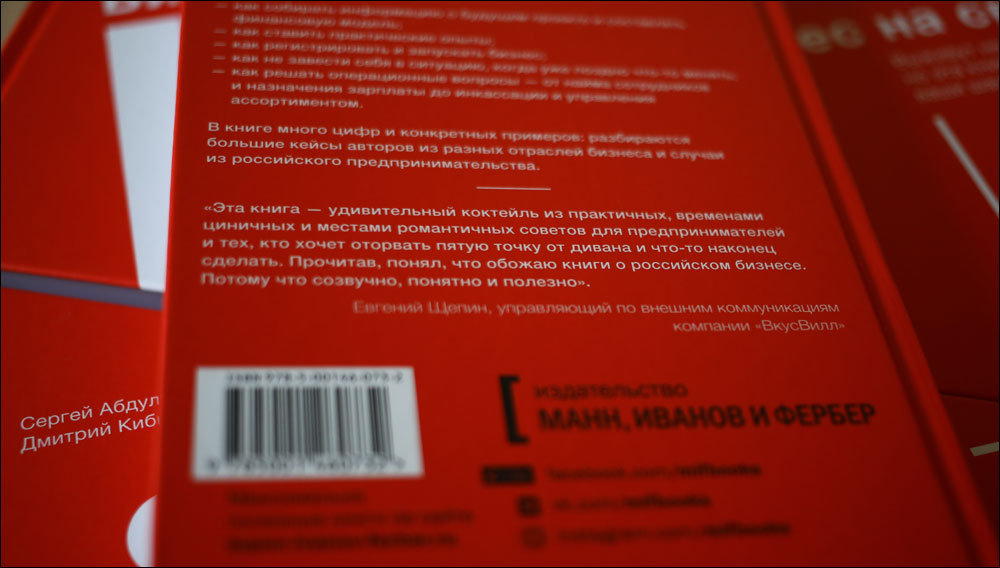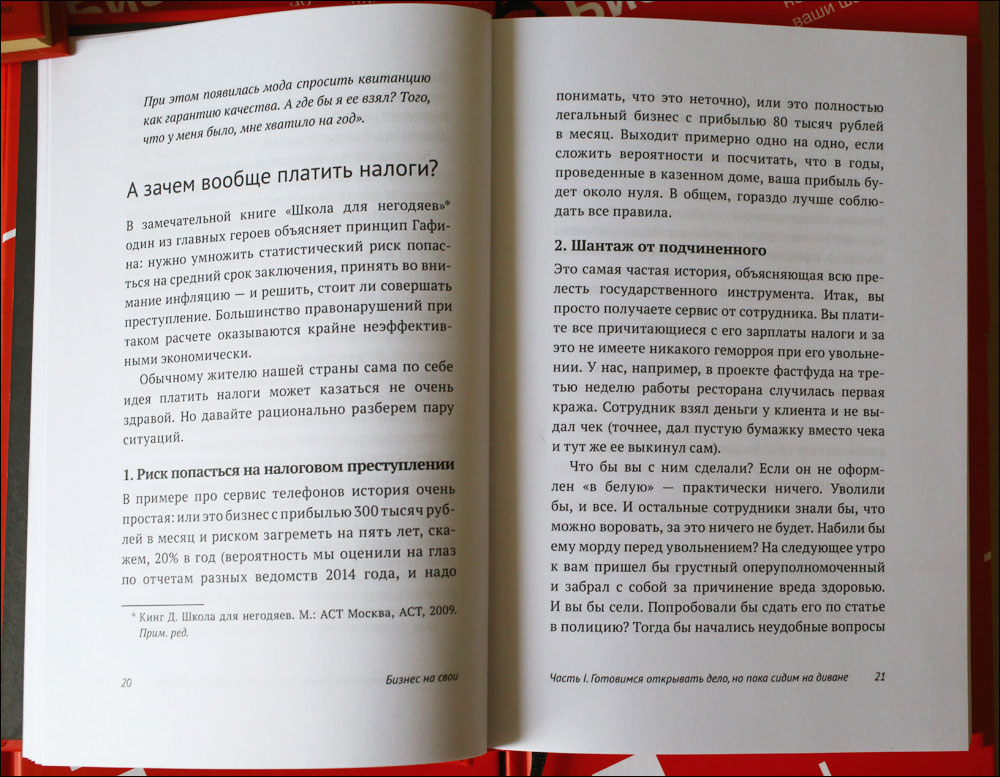Own business: a book with tactics for passing this game

Hello! I wanted to say that our third book came out yesterday, and the posts from Habr also helped a lot (and partially came in). The story is this: for about 5 years we were approached by people who did not know how to think in design, did not understand different business questions and asked the same questions.
We sent them a forest. I mean, politely refused, because they did not consider themselves entitled to give advice.
Because they themselves have not yet figured it out. Then we crossed the line of small business and came to the middle one, reworking the methodology of plugging holes into normal processes, grabbed all sorts of crap like stealing our employees, going through the bureaucracy and other joys of a large company, then we sat down with the theory of games and came to a very logical and unexpected decision with major partnership.
Then they began to answer questions. Typically, these were the same questions and required the same answers. Two years ago, a moral right appeared to tell us about what we have already seen on this path. Six months ago, the book was completed. Yesterday she finally came out.
When you write the third book, you already begin to understand what and how. Below are stories about what you should know when you write your own. Of course, this is my personal opinion, not a ready-made methodology.
How to write
Make an approximate table of contents, write 3-5 chapters with the most interesting. Next show the publisher. The cover letter briefly describes who you are, what you are, why it matters. Our letter was this: “it seems the best systematic view in Russia on how to do small business”. Not without distortions, but there were simply no others. Just recently, Tinkov’s book appeared (judging by the language, Ilyakhov) “Business without an MBA”. She's cool, she's about the same thing, there is a different look.
The publisher reads your prototype chapters and asks what the trick is. We say - we do not give advice on how to live. We talk about specific situations and what happened in them. How often. How to test the hypothesis with examples. What to look for so as not to screw up.
Here is the table of contents:


Our main goal is to show not “successful success”, but as it is.
You know, it's like getting married to a person you don't know well enough. You can make an alliance “at random”, and then get a divorce, or you can learn something about your potential second half in advance. We are in advance. Even if something terrible comes up there. Because they saw people selling apartments in order to close the debts of their business. And then they remained on the street with a family with two children.
Avoid this if possible.
So here. Then the publisher says - basically “for”. And offers to send a manuscript. All that's left is to draw the rest of the owl.
I had already written two books by that time, and roughly represented the process. But it was very hard. We rewrote the book twice because we were constantly discovering new things. It helped that we recorded a course for Cursers in Russian in the process. There are many thoughts that went into the book. The course helped to understand what we want: there are tasks and an educational result.
On assignments, I came off and roughly understood what kind of stories are needed in the book. Here are a couple of spoilers with answers:
Here is a sheet of text with examples
You decided to check whether it is possible to sell ice cream on the beach in the resort town. How to empirically verify that there will be demand on the beach?
[x] Buy ice cream at a grocery store, take dry ice, a box - sell it for one day
[] Buy a portable refrigerator and ice cream at a wholesaler and sell it for one day
[] Purchase everything you need for trade and complete all legal formalities to get started
[ ] Ask friends from other cities.
The faster and less costly you test the hypothesis, the better. The demand will not be much affected by the origin of ice cream and other factors.
You have a Vyrviglaz Toothbrush product, similar to Vyrvizub Toothbrush, but less popular. It was planned that you would sell 2,000 brushes in December, but in fact it turned out that now it is April, and there are 1800 more of them left. At the same time, “Vyrvizub” is taken at a rate of 250 pieces per month. You took Vyrviglaz at a very good price in November in advance. Return to the supplier can be no more than 30%. What to do in the general case?
[x] Return how much it will turn out to the supplier
[x] Try to sell them at a discount or for a promotion like “buy two for the price of one”
[] Leave them lying on the shelves - they don’t seem to interfere, let them stand.
[] Leave them lying on the shelves, but move them to the worst place in the display.
[] Remove from sale residues at the end of the month and dispose of.
[x] Donate them (how much will remain at the end of the month) to humanitarian aid.
Obviously, you “froze” the money in this product. Therefore, the task is to free up funds in order to invest them in a hot commodity, which will bring great profit in the same period. First, you return as much as you can to the supplier, and then sell them by stock. Oddly enough, you can also use them for donations, if you do them anyway - otherwise you will have to sacrifice something that you have in a more liquid form.
The same question about brushes, but they only got to you for implementation. What is changing in relation to them now?
[] Return how much the supplier will get
[] Try to sell them at a discount or on a stock like “buy two for the price of one”
[] Leave them lying on the shelves - they don’t seem to interfere, let them stand.
[x] Leave them lying on the shelves, but move them to the worst place in the display.
[] Remove from sale residues at the end of the month and dispose of.
[] Donate them how much will be left at the end of the month for humanitarian aid.
Yes, it is true, if implemented, it’s neither warm nor cold from their presence. Just push them away, and if the cost of renting a place in the calculation does not exceed the profit from them (most likely - no, in bad places), then let them lie. They will slowly bring you money.
Should a small store in advertising compare itself with a large one?
[x] Yes, because being second in the market and biting the first is always cool. AVIS Strategy - “We work because we want to get around them, we have something to strive for.”
[x] No, because you need to stand out with your head and not belittle your neighbor
[] No, because then the big one will be offended and “press” the little one
[] Yes, because the small one will have better prices, and everyone should see it
You’ll laugh now, but options 1 and 2 are true. Yes, it’s worth it for the reason described - this is a strong position. But no, it’s not worth it for the second reason described, because this is a long-term position for the game. Shops are already at war, so (3) is not significant, and prices are not described. In addition, in a village of 700-900 inhabitants, information about prices is available not in advertising, but in attendants. Instantly and accurately. It might be better to hear about comparison products rather than clicking on it in an ad.
What can it mean if a person on the street does not know how to find your store - one of the 20 stores in the chain?
[x] That he is newcomer
[x] That you are not working well enough on local marketing
[x] That he is an idiot
[x] That you are not working well enough on global marketing
[x] It's okay, not everyone should know this, maybe we are here trade french literature
It can mean anything, yes. Only those who are in your target audience should know about you. It is necessary to work with them.
There were 120 candidates, 30 you called for an interview, 5 you took to the store, 3 remained after the first three days. Those 25 who did not pass the interview, need to answer?
[x] Yes, inform them that the vacancy is occupied.
[] No, do not write again, so as not to remind you of the negative. And it also spends your time.
Everyone needs to answer. This is etiquette. And each of them is your potential client. Maintain a good relationship.
A client bought a chair a week ago, lost a check, and wants to return it because he didn’t like him. The chair is still in the package. Can I make a refund?
[x] Yes
[] No
[] At the discretion of the seller
According to the law on consumer protection - yes, it is possible without a check. You must confirm the fact of the purchase in any other way - an extract from the bank, an entry in your database, or witnesses are suitable. The reason for the return is not important, only the term is important.
A client bought a book a week ago at another point, he wants to return it for the reason that it does not fit the wallpaper. Return?
[] Yes
[x] No
[] At the seller’s discretion
A book, newspaper, sheet music, bra and other strange things are things that cannot be returned by law. It would be cool, right?
Crime statistics for the region tells you that there is a 0.273% chance that you will receive on the head when transferring money to the bank. You carry money to the bank every night. Daily revenue on average is 30 thousand rubles.
Collection for a year costs 40 thousand rubles, an invoice for treatment, for example, 5 thousand rubles, after which you return to normal without harming the business. Is it economically justified to risk this way?
[x] Yes
[] No The
probability reaches one in a year, that is, the expectation of losses is 35 thousand rubles. And collection - 40 thousand rubles.
There are no practical tasks in the book, but there is a lot of real information. Here's an example:

Okay, back to the project. In the end you write. By the way, the two of them are much easier to do than the one, because where one stopped, the second already knows what and how to say - and there is the opportunity not to “hang out”, plus a second point of view. Once, many years ago, the first published material - back in Astrakhan, to the newspaper - we also wrote in two hari. Recommend. Night gatherings with a huge pile of prints, pens in the "Mug" for football (because it only worked) is a bonus.
The next step is for the publisher to take the manuscript. Reads and confirms his opinion that the book will be normal. In our case, the opinion was: “Oh, I’ve also taken out something for myself to manage the publishing house.” Otpad.
Then the contract and all affairs.
Contract and all affairs
The publisher wants an exclusive license, that is, uploading a copy without typos will not work on Flibusta. More importantly, the publisher wants a worldwide license, that is, it will not work to transfer and start selling on Amazon. But at the same time, the publisher wants 5 years, and then it needs to be re-signed. This means that there is only a couple of years left until the moment when I make a break in 1 day to transfer my first book to the pirates already officially and correctly.
Now there is a trend in the development of home dofig smart speakers and wireless headphones, so the podcast market is reviving in the West. We will be noticeable in a year, but audio versions are needed now. Consequence - you must immediately sign a dopnik about audio. It is better to write an audio version in the voice of the author, but I do not pronounce the letter “p,” so I gladly announced this and got the opportunity to choose a speaker. Urrra The problem of audio versions is tables. They are in the book. Heavy handed down links.

In our agreements, we have also changed the order of approvals (not “the publisher suggested, but the author has not gone away,” but the more correct one) and citation order (I can quote up to half the book on the Internet). Over the years, the MYTH has become so friendly to the authors that it is a sight for sore eyes.
If for the first time the cover was simply offered to us, now we are asked to fill out a brief. The result was a design as I wanted, and not how it went. And without a capital set. And with more or less correct kerning. And without turning off the header in the center.

For MIF, this was somewhat bold. But I am happy.
At the same time, work is underway with the editor and corrector. These are publishing services that are part of the training package. In our case, the editor suggested changing a couple of chapters for better logic, requested a bunch of footnotes with explanations, showed where to add a couple of chapters and what, tracked the logic and all that.
The corrector just pissed me off. I returned the first version with a comment that you need to roll back all edits that do not relate to errors. Because the corrector decided that he himself would like to write a book and corrected everything in the language to the level of the official police protocol.
The publisher said yes, something overdid it. And they did it normally. But still there were language corrections, so I had to carefully read everything. By the way, it’s a special joy in upholding the language to say that if anything, I will change all the terms to the word “horseradish”, because the plant and it are literary. One cannot argue with this within the framework of the rules. After this discovery, it became somehow easier.
Oh, and one more thing. They are corrected in Word, and somewhere from the third iteration they look only at edits. Therefore, if you add something with an Easter egg in white text on a white background, then later, in layout, they roll styles and everything becomes black. Pay attention to the Latin name of the sales funnel (specifically funnels) in the table of contents.
Promotion
When you have a pre-compiled version of the file (no output and no cover), you need to give it to people for reviews. We gave it to Eugene from Vkusville, and he wrote a review, from which it is clear that they met everything about the same there, but are somewhat afraid to tell. A couple of people just did not have time to read (we gave to friends from big business, and there many had the nearest window in May, when the print run was already out of print), Tinkov did not answer at all.

It turned out that the MIF does not mark the files that it sends. That is, with a leak into the network, it is not clear who leaked it. Here's how: I'm not against leaks, but I want to know the vectors. Therefore, we marked our own. The technology was described in the fiction of my childhood - I advise the story "The Destruction of Angkor Apeiron" by Fred Saberhagen.
Circulation comes almost last. This time the format is smaller than “Business as a game” and “Business Evangelist”, the paper is thick and white (it was thick and yellowish), a bug with a ribbon-lassa that could fly into the factory under the cover and do like this:

This is a rare case on “Business as a game”
Then you all agree together to participate in the promotion. I already knew that I would have to speak with reporters, participate in the broadcasts, do an autograph session (refused), this year we added Instagram broadcast. Plus there were requests for additional materials. As usual, journalists will be given direct chapters to quote. I think they will like the logic of the decomposition of “Why pay taxes”. Spoiler: not because it matters. And because there is a Gafin principle - you evaluate the chance to get caught and the benefits of crime. And if it is, it has a justification. Plus other reasons. A rational game is that smart people are sitting in the tax who are building restrictions on this principle. True, the problem of Russia is that there are still traditions.

The book itself
It turned out five main parts:
- Preparing for the project before you even start to do something: these are basic things like understanding what you are getting into. The story is this: there is a chance to earn a lot and lose a lot. And this is exactly a couple of years of your time. The first chance is low, the second is higher. If you could buy such a lottery ticket instead of starting a project, would you take it?
- Now the numbers: we are counting the financial model, we are conducting reconnaissance, and we are setting up experiments. The most important part of the project, because if you don’t understand what is possible and what is not possible on the shore, then everything will be bad.
- Opening the first point on the example of the store, everything from start to finish. Here you can find out some of my posts from Habr, adapted for the book. Why shop? Because there are all operations specific to other types of business offline, plus more.
- Marketing is basic. We almost do not touch on-line (specific details become obsolete during the publication of the book), but give general principles, how and what to evaluate.
- Staff is a damn important chapter on how to manage a team at a basic level for introverts.

As usual, all this with a bunch of stories. Dragging a major from my childhood I read the last book and said that he was very happy. I think one more hello from the past awaits him.

And practice, a lot of practice. Pay attention to the last story on this page.
Some chapters are very large and dense in volume of information:
Picture-canvas under the spoiler

This year we tried exclusive with the publisher: it is very important for them to see sales on their online store and collect the first audience (otherwise we would sell everything directly from our website and in our stores). Therefore, they only have a book for two weeks, but for this they invest much more in the promo than usual and promise a good numerical sales result.

Here is a link to the MYTH and all sorts of details , there you can buy. Well, I want to say thanks to all those who asked us uncomfortable questions (about half - on Habré), which helped walk really on what is important.
